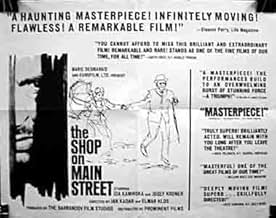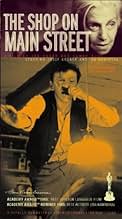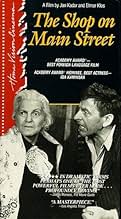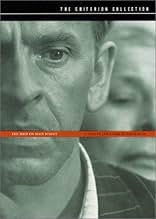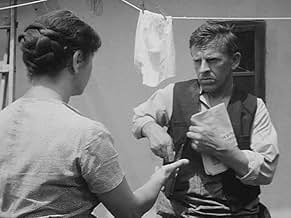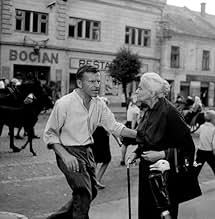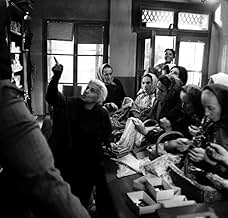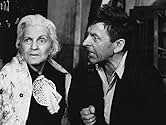IMDb RATING
8.2/10
10K
YOUR RATING
A carpenter in the Fascist Slovak State is appointed "Aryan controller" of a Jewish widow's store.A carpenter in the Fascist Slovak State is appointed "Aryan controller" of a Jewish widow's store.A carpenter in the Fascist Slovak State is appointed "Aryan controller" of a Jewish widow's store.
- Won 1 Oscar
- 6 wins & 4 nominations total
Ida Kaminska
- Rozalia Lautmannová
- (as Ida Kaminská)
Frantisek Zvarík
- Markus Kolkocký
- (as Frantisek Zvarík)
Ladislav Farkas
- Young Man
- (uncredited)
Luise Grossová
- Eliasová
- (uncredited)
Juraj Herz
- Jewish Man
- (uncredited)
Featured reviews
10Buddy-51
The last half hour of this film may well be the most emotionally intense examination of a personal moral crisis ever put on film.
The movie achieves that rarest feat of being able to portray one of the most horrendous experiences in human history without resorting to sensationalism or sentimentality.
The acting of Josef Kroner and Ida Kaminska is without peer and the musical score is quite simply haunting and adds immeasureably to the film's overall effectiveness.
Make every effort to see this true cinematic masterpiece.
The movie achieves that rarest feat of being able to portray one of the most horrendous experiences in human history without resorting to sensationalism or sentimentality.
The acting of Josef Kroner and Ida Kaminska is without peer and the musical score is quite simply haunting and adds immeasureably to the film's overall effectiveness.
Make every effort to see this true cinematic masterpiece.
Objective aethetics can sometimes require background information in order to properly judge a piece of art. In the case of this film, it is essential to realize that the film was made under heavy communist censorship. Thus we have plenty of anti-fascist rhetoric as well as the heroic rebel character who abound in Marxist cinema. Yet behind this facade is a devastating critique of the ideology of terror which is the foundation of not only fascism, but the communism of 1960's Eastern Europe.
There's a whole tradition of political film forced to obscure themes enough to slide them past superficial censors and into the minds of a sometimes discerning audience. It can be done by simply universalizing the themes and parallelling the setting with something the audience could recognize. But Chaplin had explored a different method with The Great Dictator, by finding the similarities between two seemingly opposite figures. Through his critique of Hitler, he took on American pomposity and brutality. It is a particularly effective method as it allows the target no way out, turning its own accusations against itself.
Much has been said about the comedy and tragedy's coexistence in this film, and it is indeed an important facet. The simple reason being that life is both funny and tragic, thus to universalize the themes so that any person can be in the Brtko's place, it is imperative to represent both spheres of life.
But the theme is not limited to a broad contemplation on life in the universal sense. There is a much more devestating critique of all totalitarian ideologies. Brtko begins with a simple and, one could argue, natural sense of survival. He is pushed into greed by his wife, and is then pushed into desperation by the his state-sanctioned duty. He finally arrives into a complete state of terror caused by the irrationality of the events around him, and heightened by his relationship with Mrs. Lautmann. Of course, this kind of degradation could happen just as easily under a communist regime as in the days of the Nazis, and this was what the censors missed and the Academy Awards loved.
Few films have the social significance of this one. Not only for its powerful message, but the fact that it is a glimpse into a world we know little about.
5 out of 5 - Essential
There's a whole tradition of political film forced to obscure themes enough to slide them past superficial censors and into the minds of a sometimes discerning audience. It can be done by simply universalizing the themes and parallelling the setting with something the audience could recognize. But Chaplin had explored a different method with The Great Dictator, by finding the similarities between two seemingly opposite figures. Through his critique of Hitler, he took on American pomposity and brutality. It is a particularly effective method as it allows the target no way out, turning its own accusations against itself.
Much has been said about the comedy and tragedy's coexistence in this film, and it is indeed an important facet. The simple reason being that life is both funny and tragic, thus to universalize the themes so that any person can be in the Brtko's place, it is imperative to represent both spheres of life.
But the theme is not limited to a broad contemplation on life in the universal sense. There is a much more devestating critique of all totalitarian ideologies. Brtko begins with a simple and, one could argue, natural sense of survival. He is pushed into greed by his wife, and is then pushed into desperation by the his state-sanctioned duty. He finally arrives into a complete state of terror caused by the irrationality of the events around him, and heightened by his relationship with Mrs. Lautmann. Of course, this kind of degradation could happen just as easily under a communist regime as in the days of the Nazis, and this was what the censors missed and the Academy Awards loved.
Few films have the social significance of this one. Not only for its powerful message, but the fact that it is a glimpse into a world we know little about.
5 out of 5 - Essential
This movie is one of my all-time favorites. It depicts a lazy, self-interested "everyman" caught up in a personal struggle of good and evil. The directors/writers question the moral responsibility of genocide, as smalltown Czechs under Nazi domination respond to their Jewish neighbors. Jews are no longer allowed to own shops, so their businesses' control and ultimate ownership is turned over to Christians -- namely, Nazi sympathizers. One such Christian, brother-in-law of a high-ranking official, is given a button shop, owned by a deaf, elderly Jewish woman, who is not even aware that there is a war going on. Due to her deafness, she has the innocence of a child. The Christian overseer finds that the shop makes no money whatsover, but also learns that the Jewish community supports the old woman and will pay him a salary to watch over her. What develops is a platonic love story between the two, hilariously funny due to the old woman's inability to comprehend the impending doom around her, and her assistant's struggle to shield her from harm while concerned with self-preservation. The movie works on numerous levels -- as a love story, including dreamlike fantasy elements of a bygone world where Nazi horrors don't exist; and as a tale of ultimate moral responsibility. It is a story of basically good people, who say nothing, see nothing, hear nothing, and do nothing when genocide threatens their neighbors, and who thus enable genocide to occur. The brilliant combination of hysterically funny scenes set against a background of impending mass murder brings this film to a life that is lacking in most humorless holocaust-oriented films. The laughter through tears produces an ultimate impact that is emotionally devastating. This film justly received an Oscar for Best Foreign Film when it was released. It was produced during a brief high point of the Czech film industry, prior to Russia's reconquering of the country and squelching any artistic freedom. All the performers are exceptional, particularly the two leads. (After the Russian takeover, actress Ida Kaminski emigrated to New York and attempted to revive the Yiddish Theatre.)
10hh-10
This is one of the most elegantly crafted and powerful movies relating to the Holocaust that I have ever seen.
As the editor and publisher of the memoir of a Jewish Holocaust survivor from Slovakia, I can aver that this movie is achingly true to life. The film's setting could be this woman's hometown. Like Mrs. Lautmann in the movie, this woman had lived behind one of the family's shops on her hometown's Main Street and her family's properties were seized during the Aryanization depicted in this movie.
How the writer, director, and actors of this seemingly small film were able to condense and convey so much of the socio-economic and political tenor of that time and place, with such acumen, dark humor, and pathos is astounding.
It seamlessly moves toward an inexorable conclusion, with each successive scene leading the viewer deeper into the world of the two protagonists and reeling from the truths that the filmmakers expertly offer up.
It is days after viewing it, and still, I cannot shake this movie.
As the editor and publisher of the memoir of a Jewish Holocaust survivor from Slovakia, I can aver that this movie is achingly true to life. The film's setting could be this woman's hometown. Like Mrs. Lautmann in the movie, this woman had lived behind one of the family's shops on her hometown's Main Street and her family's properties were seized during the Aryanization depicted in this movie.
How the writer, director, and actors of this seemingly small film were able to condense and convey so much of the socio-economic and political tenor of that time and place, with such acumen, dark humor, and pathos is astounding.
It seamlessly moves toward an inexorable conclusion, with each successive scene leading the viewer deeper into the world of the two protagonists and reeling from the truths that the filmmakers expertly offer up.
It is days after viewing it, and still, I cannot shake this movie.
A fine movie showing just how easy it is for people to become oppressors. Tono is just an average Joe, keeping his nose clean, until he is co-opted into participating in the Nazi regime by his well-placed brother-in-law. Along the way Tono's wife shows the warping power of greed. The seeds of a fatal moral dilemma are set as Tono becomes the Aryan "controller" of a Jewish business run by a befuddled widow. Ultimately the horror becomes clear as the Jews are rounded up and the widow - played brilliantly - briefly comes to her senses and realizes she is the victim of a "pogrom." All the relationships and characters in the movie are finely drawn and well acted, and the production values were excellent.
The version I reviewed was subtitled in English, and unfortunately some of the subtitles were difficult to read.
The version I reviewed was subtitled in English, and unfortunately some of the subtitles were difficult to read.
Did you know
- TriviaThis movie was shot exclusively in the small Slovak city of Sabinov.
- GoofsSet in 1942, a German troop train moves through the town. The train is carrying Soviet cold-war era trucks and anti aircraft guns that didn't exist until the 1950s. It's understandable for them to make this substitution since any authentic German equipment would have been scrapped long before.
- Quotes
Jozef Katz: I don't understand anything any more. But I know one thing. When the law persecutes the innocent, that's the end of it. And those who make the law, too.
- ConnectionsEdited into CzechMate: In Search of Jirí Menzel (2018)
- SoundtracksÉn vagyok a falu rossza egyedül
(uncredited)
Written by Lajos Békésy, Imre Garsi and László Patak
Performed by Jozef Kroner, Frantisek Zvarík, Hana Slivková and Elena Zvaríková
Details
- Release date
- Country of origin
- Languages
- Also known as
- The Shop on Main Street
- Filming locations
- Production company
- See more company credits at IMDbPro
- Runtime2 hours 8 minutes
- Color
- Sound mix
- Aspect ratio
- 1.37 : 1
Contribute to this page
Suggest an edit or add missing content

Top Gap
By what name was Le miroir aux alouettes (1965) officially released in India in English?
Answer

